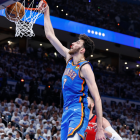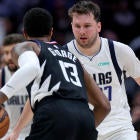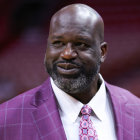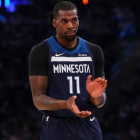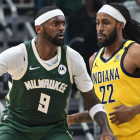Billy Hunter, the ousted former executive director of the National Basketball Players Association, has identified Kobe Bryant and his agent, Rob Pelinka, as the power brokers who pushed him to accept a 50-50 labor deal that Hunter claims was negotiated behind his back during the 2011 lockout.
In a 21-page court filing this week in Hunter's lawsuit against the NBPA, its former president, Derek Fisher, and his business manager, Jamie Wior, Hunter laid out the case for how he believes he was sandbagged by Fisher during the labor talks. Hunter is alleging defamation and breach of contract in the lawsuit, and Fisher's alleged role in a so-called secret deal with the owners to end the lockout would be relevant if Fisher usurped Hunter's authority as the sole bargaining agent for the players under the NBPA's by-laws.
Hunter, who was voted out as executive director in February 2013, is seeking as much as $10.5 million in pay and benefits owed to him under a 2010 contract extension that Fisher, as union president, approved. Hunter, whose actions as union chief also have been been the subject of a federal criminal investigation and inquiries by the Department of Labor and New York attorney general, filed statements with the California Superior Court in Los Angeles from three former executive committee members who stated that his contract with the NBPA -- never voted on by the full board of player representatives -- was valid.
“Given everything I know about Mr. Hunter’s service to the union and the benefit the union received from Mr. Hunter’s work, the union’s current position that Mr. Hunter does not have a valid employment contract is outrageous," former executive committee member Theo Ratliff said in a declaration on Hunter's behalf with the court.
Former committee members Mo Evans and Etan Thomas also filed declarations with the court supporting Hunter.
But the most interesting series of events outlined by Hunter were those linking Bryant and Pelinka (who also represents Fisher) to the surprising collapse of negotiations at the Waldorf Astoria in New York on Oct. 28, 2011 -- about a month before a new labor deal finally was struck, salvaging a 66-game season and reordering the financial and competitive landscape of the sport.
“Late in the evening before the Waldorf Astoria meeting, I was already in bed for the night when my phone rang," Hunter wrote in the court filing. "The caller identified himself as the ‘Black Mamba.’ I knew it was Kobe Bryant, a superstar player for the Los Angeles Lakers and the highest paid player in the NBA."
Bryant informed Hunter that his agent, Pelinka also was on the phone.
At that point, Hunter said that Bryant urged him to accept a 50-50 split of revenue in the meeting the following day and "put this thing to bed. ... Do the deal."
Hunter said Bryant also told him, "I got your back."
This all seems perfectly reasonable. Everyone following the negotiations knew that they were heading toward a 50-50 split of revenue or something very close to that figure. (I knew it a month earlier, when I sent this to the negotiators at the Lowell Hotel. And in fact, that's exactly how the impasse finally ended a month later.)
Pelinka did not respond to a request for comment, nor did Fisher's business manager, Wior. The NBPA also did not issue a statement about Hunter's latest allegations.
Heading into the Oct. 28 meeting -- which many observers, myself included, believed would result in a deal -- the owners had dropped their precondition that the players agree to a 50-50 split. Hunter had been holding fast at accepting no less than 52 percent of revenues for the players, and had been under intense pressure from high-profile agents not to give back any more in the negotiation.
Several of those agents later played a significant role in Hunter's ouster.
So after months of haggling and hundreds of millions in lost revenue for everybody, it wouldn't have been unusual for the highest-profile player in the league and his agent -- who also happened to represent the union president -- to call Hunter and let him know that if he went to 50-50, he'd have their support. Cut your losses and get this thing over with, they essentially were saying.
They did everything but send Hunter a cake.
Hunter then makes a leap in his declaration to the court, characterizing Bryant's phone call as evidence that Fisher had cut a 50-50 deal with the owners without Hunter's knowledge or authority.
"What Bryant and Pelinka were telling me is that a 50-50 deal had already been completed behind my back," Hunter wrote.
How does Hunter know that this is what Bryant and Pelinka were telling him? How does he know that Bryant and Pelinka weren't simply letting Hunter know that he'd have their support if he did the deal at 50-50? (As it turned out, Hunter should've done the deal at 50-50 that day, because that's the same deal he eventually got after losing another month of games. Ah, the memories.)
Hunter said he confronted Fisher, who denied engaging in secret negotiations with league negotiators and asserted, instead, that Bryant and Pelinka had done so. That's interesting, but Hunter is not suing Bryant or Pelinka for breach of contract; he's suing Fisher. So where this goes from here will hinge on matters of contract law that are beyond the scope of my knowledge.
I do know the following, because this exercise today forced me to relive a time in my life that I'd rather forget:
- I explained here why I believed everything was aligned for a deal to be made at the Oct. 28, 2011 negotiation in question.
- When a deal wasn't made -- Hunter walked out of the bargaining session after refusing again to budge below a 52-48 split for the players -- I expressed my belief that something wasn't right. Someone or something was preventing Hunter and/or commissioner David Stern from budging from their established bargaining positions.
Who or what was that someone or something? That will be answered in California Superior Court in Los Angeles.
Can someone let me know how that all turns out, once I emerge from therapy for PTLD -- post-traumatic lockout disorder?














